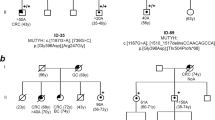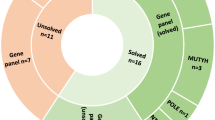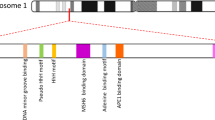Abstract
APC is often cited as a prime example of a tumor suppressor gene. Truncating germline and somatic mutations (or, infrequently, allelic loss) occur in tumors in FAP (familial adenomatous polyposis). Most sporadic colorectal cancers also have two APC mutations1. Clues from attenuated polyposis2,3,4, missense germline variants with mild disease5,6 and the somatic mutation cluster region (codons 1,250–1,450)1,7,8 indicate, however, that APC mutations might not result in simple loss of protein function. We have found that FAP patients with germline APC mutations within a small region (codons 1,194–1,392 at most) mainly show allelic loss in their colorectal adenomas, in contrast to other FAP patients, whose 'second hits' tend to occur by truncating mutations in the mutation cluster region. Our results indicate that different APC mutations provide cells with different selective advantages, with mutations close to codon 1,300 providing the greatest advantage. Allelic loss is selected strongly in cells with one mutation near codon 1,300. A different germline–somatic APC mutation association exists in FAP desmoids. APC is not, therefore, a classical tumor suppressor. Our findings also indicate a new mechanism for disease severity: if a broader spectrum of mutations is selected in tumors, the somatic mutation rate is effectively higher and more tumors grow.
This is a preview of subscription content, access via your institution
Access options
Subscribe to this journal
Receive 12 print issues and online access
$209.00 per year
only $17.42 per issue
Buy this article
- Purchase on Springer Link
- Instant access to full article PDF
Prices may be subject to local taxes which are calculated during checkout


Similar content being viewed by others
References
Miyaki, M., Tanaka, K., Kikuchi-Yanoshita, R., Muraoka, M. & Konishi, M. Familial polyposis: recent advances. Crit. Rev. Oncol. Hematol. 19,1– 31 (1995).
Spirio, L. et al. Alleles of the APC gene: an attenuated form of familial polyposis. Cell 75, 951–957 (1993).
Friedl, W. et al. Attenuated familial adenomatous polyposis due to a mutation in the 3´ part of the APC gene. A clue for understanding the function of the APC protein. Hum. Genet. 97, 579– 584 (1996).
Hodgson, S.V. et al. Two cases of 5q deletions in patients with familial adenomatous polyposis: possible link with Caroli's disease. J. Med. Genet. 30, 369–375 ( 1993).
Laken, S.J. et al. Familial colorectal cancer in Ashkenazim due to a hypermutable tract in APC. Nature. Genet. 17, 79– 83 (1997).
Frayling, I.M. et al. The APC variants I1307K and E1317Q are associated with colorectal tumors, but not always with a family history. Proc. Natl. Acad. Sci. USA 95, 10722–10727 (1998).
Miyoshi, Y. et al. Somatic mutations of the APC gene in colorectal tumors: mutation cluster region in the APC gene. Hum. Mol. Genet. 1, 229–233 (1992).
Polakis, P. The adenomatous polyposis coli (APC) tumor suppressor. Biochim. Biophys. Acta. 1332, F127–F147 (1997).
Ichii, S. et al. Detailed analysis of genetic alterations in colorectal tumors from patients with and without familial adenomatous polyposis (FAP). Oncogene 8, 2399–405 ( 1993).
Spirio, L.N. et al. Alleles of APC modulate the frequency and classes of mutations that lead to colon polyps. Nature Genet. 20, 385–388 (1998).
Miyaki, M. et al. Characteristics of somatic mutation of the adenomatous polyposis coli gene in colorectal tumors. Cancer Res. 54, 3011–3020 (1994).
Tomlinson, I. & Bodmer, W. Selection, the mutation rate and cancer: ensuring that the tail does not wag the dog. Nat. Med. 5, 11–12 (1999 ).
Biggs, P.J., Chapman, P., Lakhani, S.R., Burn, J. & Stratton, M.R. The cylindromatosis gene (cyld1) on chromosome 16q may be the only tumour suppressor gene involved in the development of cylindromas. Oncogene 12, 1375– 1377 (1996).
Hemminki, A. et al. Localization of a susceptibility locus for Peutz-Jeghers syndrome to 19p using comparative genomic hybridization and targeted linkage analysis. Nature Genet. 15, 87–90 (1997).
Berx, G., Nollet, F. & van Roy, F. Dysregulation of the E-cadherin/catenin complex by irreversible mutations in human carcinomas. Cell Adhes. Commun. 6, 171–184 (1998).
Nugent, K.P. et al. Phenotypic expression in familial adenomatous polyposis: partial prediction by mutation analysis. Gut 35, 1622–1623 (1994).
van der Luijt, R. et al. Rapid detection of translation-terminating mutations at the adenomatous polyposis coli (APC) gene by direct protein truncation test. Genomics 20, 1–4 ( 1994).
Won, Y.J. et al. Germline mutations of the APC gene in Korean familial adenomatous polyposis patients. J. Hum. Genet. 44, 103 –108 (1999).
Frayling, I.M. & Rowan, A.J. in Molecular Diagnosis of Genetics Disease (ed. Elles, R.) 63–98 (Humana, Totowa, New Jersey, 1996).
Powell, S.M. et al. APC mutations occur early during colorectal tumorigenesis. Nature 359, 235–237 (1992).
Novelli, M.R. et al. Polyclonal origin of colonic adenomas in an XO/XY patient with FAP. Science 272,1187– 1190 (1996).
Luongo, C., Moser, A.R., Gledhill, S. & Dove, W.F. Loss of Apc+ in intestinal adenomas from Min mice. Cancer Res. 54, 5947–5952 (1994).
Miyaki, M. et al. Coexistence of somatic and germ-line mutations of APC gene in desmoid tumors from patients with familial adenomatous polyposis. Cancer Res. 53, 5079–5082 (1993).
Caspari, R. et al. Familial adenomatous polyposis - desmoid tumors and lack of ophthalmic lesions (CHRPE) associated with APC mutations beyond codon 1444 . Hum. Molec. Genet. 4, 337– 340 (1995).
Wells, D., Sherlock, J.K., Handyside, A.H. & Delhanty, J.D.A. Detailed chromosomal and molecular genetic analysis of single cells by whole genome amplification and comparative genomic hybridisation. Nucleic Acids Res. 27, 1214–1218 (1999).
Acknowledgements
We thank members of the Equipment Park, ICRF for assistance with genotyping and sequencing and N.A. Wright for advice on histology.
Author information
Authors and Affiliations
Corresponding author
Rights and permissions
About this article
Cite this article
Lamlum, H., Ilyas, M., Rowan, A. et al. The type of somatic mutation at APC in familial adenomatous polyposis is determined by the site of the germline mutation: a new facet to Knudson's 'two-hit' hypothesis. Nat Med 5, 1071–1075 (1999). https://doi.org/10.1038/12511
Received:
Accepted:
Issue Date:
DOI: https://doi.org/10.1038/12511
This article is cited by
-
Heterozygous APC germline mutations impart predisposition to colorectal cancer
Scientific Reports (2021)
-
Inherited Follicular Epithelial-Derived Thyroid Carcinomas: From Molecular Biology to Histological Correlates
Endocrine Pathology (2021)
-
Bcl9 and Pygo synergise downstream of Apc to effect intestinal neoplasia in FAP mouse models
Nature Communications (2019)
-
Ubiquitylation and degradation of adenomatous polyposis coli by MKRN1 enhances Wnt/β-catenin signaling
Oncogene (2018)
-
Gastric tumours in FAP
Familial Cancer (2017)



